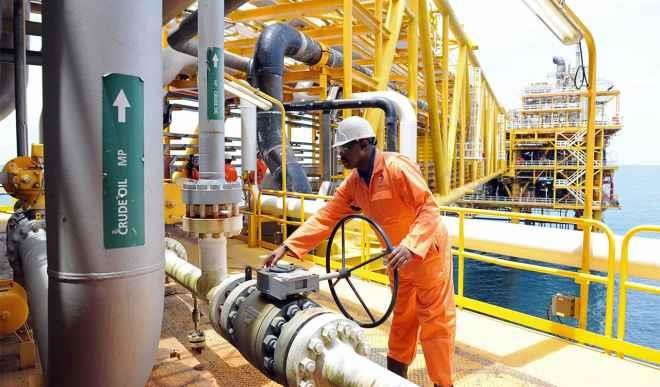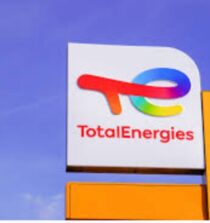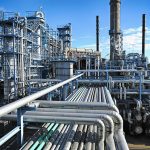A country of many paradoxes, Nigeria does not refine a drop of all the products it consumes. But the Nigerian National Petroleum Company says it has devised a different strategy to get the country’s ailing refineries back to function. Will they work this time? Maybe, maybe not, writes Emmanuel Addeh.
It’s almost like a basket case. The more money that is pumped into fixing Nigeria’s ailing refineries, the less results it yields.
Like is wont to happen with many public institutions in Nigeria, there is hardly any official figure as to the total amount that has been spent on what is now seen as a national drainpipe.
But if anything, what even the drivers and overseers of the unending refineries repair processes, past and present, have come to agree is that it’s all been a wild goose chase over the years.
To be sure, the problem is not new. Over the years, Nigeria had literally succeeded in grounding all its three refineries and is today a net importer of all refined products consumed in the country.
There has rarely been any administration in recent times that did not sink billions of dollars into the facilities to turn them around. But they have all met a dead end.
While the recent announcement by the NNPC gave Nigerians a feeling of déjà vu, having walked this path many times, the cynicism that has followed the decision has been resounding. Will the national oil firm prove its critics wrong?
Nigeria is borrowing massively to fix the facilities, before it will, according to the new plan, be handed over to private companies to manage. Will this be another exercise in futility?

A new $3bn deal?
The NNPC’s new deal to revamp the non-functional assets, particularly the Port Harcourt refinery, with an Italian Firm, Maire Tecnimont SPA for a full overhaul is expected to cost $1.5 billion.
Recall that in March, the Federal Executive Council (FEC) approved the sum for the modernisation of the oil refinery, which is expected to be completed in three phases.
The first phase is scheduled to be rounded off within 18 months from the point of agreement, taking the refinery to 90 per cent production capacity, with the second and final phases to be carried out within 24 months and 44 months respectively, according to the schedule of activities.
Funding for the project will come from the state-oil company’s cash flow, budget provisions and Afreximbank, Minister of Petroleum Resources, Mr Timipre Sylva, stated last year.
Although it could not be independently verified whether the local content expectation was met, NNPC had said that less than 2.5 per cent or about 70 of the entire workforce on the project would be Nigerians.
NNPC’s Group Managing Director, Mallam Mele Kyari, at the signing ceremony reiterated that unlike in the past, the current exercise wasn’t a turnaround maintenance, but a complete overhaul and rehabilitation of the plant.
“I have said it over and over that we have not taken care of these refineries over the years, that we have mismanaged the turnaround maintenance work over time in the last 20+ years, these plants have degenerated to a level that today, we are not turning around but resuscitating them, which is different from TAM,” he stated.
The complex is composed of two refineries totalling an overall capacity of approximately 210,000 bpd (barrels per day).
In August last year, the federal government further approved the contract sum of $1.5 billion for the rehabilitation of the Warri and Kaduna refineries. The extent of work in those facilities are not public yet.
While the sum of $897, 678, 800 was sanctioned for the rehabilitation of the Warri Refinery, $586, 902,256 was approved for the Kaduna Refinery. The contracts were awarded to Saipem SPA and Saipem Contracting Ltd.
For the Kaduna and Warri assets, the first phase is within 21 months; in 23 months, Phase 2 will be completed and in 33 months, the full rehabilitation will be completed, according to the plan.
The concerns
Even the NNPC boss admits that those who have expressed concerns over the ability of the NNPC to see through the new deal are justified, given the not so enviable antecedents of the national oil firm.
With the first refining from the Port Harcourt refinery initially set for 18 months, which would have been December this year, counting from June 2021 when the deal was signed, now deferred, the timelines are already being missed.
During the last inspection, Sylva shifted the completion of the first phase which would have been latest seven months from now, to the first quarter of 2023.
The minister said the Port Harcourt plant would refine 60,000 barrels of crude per stream day (bpd) in the first instance, when it resumes operations.
“This project kicked off second quarter last year, and where they are now is quite impressive. It is on schedule,” Sylva said. But it’s not. It has already overshot the December deadline set by the NNPC.
“The commitment is to deliver 60,000 barrels per day from this refinery by the first quarter of next year, and, of course, we are quite happy,” he said
A history of waste
In 2020, the NNPC published an audited financial report for the first time in its 43 years of operation. In 2018 alone, the report revealed that the refineries incurred a total loss of N154 billion, with the Port Harcourt refinery losing N45.59 billion, the Warri refinery about N44.44 billion, and the Kaduna refinery losing N64.34 billion.
But those are not monies for turnaround or rehabilitation. They are simply for maintaining what the NNPC calls line items as well as paying workers in the non-functional refineries.
Although actual figures are rarely available as many of the turnaround maintenance exercises were shrouded in secrecy, at least before now, it is estimated that about $25 billion may have gone down the drain fixing the intractable problem in the last 25 years.
Indeed, many Nigerians have suggested that instead of sinking another $3 billion, about N1.8 trillion in the parallel market, the refineries should be sold off to private investors.
Not a few believe that it is absurd to keep spending money without results and yet dig further into debt, even when it’s obvious that the country is falling into a debt trap.
Furthermore, at the time the contracts were awarded, several questions were raised as to how transparent the “open competitive bidding” for the project was, how many companies submitted bids and when the technical evaluation was done.
A number of Nigerians at the time thought it was senseless to continue to literally do the same thing over and over and expecting a different result.
While an oil and gas expert and former Chair of the Society of Petroleum Engineers (SPE), Joe Nwakwue, described it as a wrong step, he argued that if the country has not been able to run any commercial venture profitably, there’s no hope it will be different this time.
He called for privatisation of the refineries, using the most appropriate models, maintaining that private sector capital and operational control is the most promising option for the country.
In a separate forum, renowned economist, Prof. Pat Utomi, said the rehabilitation amounted to a waste of resources, arguing that there are other areas begging for government attention but certainly not the rehabilitation of an asset already earmarked for sale.
“The decision of federal government to invest $1.5 billion in the repair of Port Harcourt refinery is unwise, unreasonable and has no basis,” he stated
In the same vein, Director-General of the Lagos Chamber of Commerce and Industry (LCCI), Dr Muda Yusuf, argued that the government has no business putting more money into the Port Harcourt refinery, while Dr Olanrewaju Aladeitan, a lecturer at the University of Abuja faulted government’s action, saying it is one step forward and three steps backwards.
In the same vein, economist and founder of Stanbic IBTC Bank Plc, Atedo Peterside, who said the NNPC would only “enmesh Nigeria into a deeper financial mess by throwing $1.5 billion (including debt) at a problem it created,” recommended an end to the ‘nightmare’ through a Bureau of Public Enterprise (BPE) core investor sale.
Former Vice President Atiku Abubakar, had also asked government to urgently “privatise our refineries and the NNPC through the time-tested Nigeria LNG model in which the federal government owns 49 per cent equity and the private sector controls 51 per cent.”
Will incoming govt retain same model?
One of the biggest fears being expressed is that if the next administration which will take over from May 29, 2023, is not well disposed to the model adopted by the NNPC, it may decide to jettison the entire process.
If the next government resolves to throw the current arrangement in the waste bin, it wouldn’t be the first time.
The Olusegun Obasanjo administration in the last days of the government had actually sold off two of the country’s refineries before it was reversed by his successor, the late President Umaru Yar’Adua.
Years after, a pained Obasanjo recalled that Africa’s richest man, Aliko Dangote, leading a consortium of investors had paid $750 million for the two refineries as the federal government was unable to manage them at the time.
He accused Yar’Adua of failing to consolidate on the sale of the refineries so the investors could revamp them, but fell to pressure and cancelled the sale.
“The refineries are old and Dangote and some investors paid $750 million for two of the refineries. My successor came to office and reversed the sale. He even refunded the money they paid.
“So, I went to him and said ‘why did you do this?’ He said it was because of pressure. So, I said ‘so the pressure of some people was more important than the interest of the whole nation?’
“Right now, you will hardly be able to sell the refineries for more than $250m because they are very old,” said Obasanjo, years after the reversal.
Bluestar, where Dangote an interest had bought controlling stakes in the Port Harcourt and Kaduna refineries in the last days of the administration of Obasanjo, prompting accusations of cronyism.
It was later refunded $561 million it paid for the Port Harcourt refinery and the $160 million it paid for Kaduna. Will the next administration follow suit and reverse the current deal? The next few months will tell!
Building new ones
Although some Nigerians have maintained that the funds being sunk into revamping the refineries would be enough to build new ones, the NNPC argues that the country does not have the financial muscle now to build new ones.
It further noted that petroleum refining as a business is too important to be left in private hands entirely because of its security implications.
NNPC Group Managing Director, Kyari, said building a new refinery now would cost the country about $10 billion which is far beyond the $1.5 billion earmarked for the rehabilitation of Port Harcourt refinery.
He also said the country would have to live with importation of petroleum product, especially petrol, for another four years if the country ventures into building a new refinery.
“We have people saying why not build a new one; why will you repair an old refinery with $1.5 billion? The fact is available even by Google search, what it takes to build a refinery of this status today.
“It will be difficult for the country to build a new refinery as it will take four years for it to commence production. It is around $7 billion and $12 billion to construct a refinery of this nature (Port Harcourt refinery),” he argued.
But while questions remain over the new contracts, the real test would be from May, 2023 when a new administration takes over and what it decides to do with the current arrangement.









I don’t think the title of your article matches the content lol. Just kidding, mainly because I had some doubts after reading the article.
A beacon of excellence in pharmaceutical care.
can i buy cheap lisinopril without insurance
Their medication reminders are such a thoughtful touch.